A GERM OF AN IDEA
A note I wrote today:
Rajeshwar:
I've been thinking a bit more about the idea I tossed out to you earler today. The Manipuri-American IT get-together. I think we should do it, with all the various IT people attending to discuss how we can connect and interact and see what comes of it. Connectivity and network can play a special role for the future of small cultures. I would like to explore that.
How many IT people do you think there are here in the US and Canada from Manipur?
Let's you, Nick and I sit down sometime.
BTW thanks for the software handholding. I upgraded to OS X Tiger!
Tamo Somi
Wednesday, August 17, 2005
Friday, August 12, 2005
BI-CONTINENTAL SHOOT
Hot again on Fifth Avenue yesterday, even tho it was 7 when we started. Dusk over here, dawn over there; HD crew here, miniDV over there. There were joggers round the reservoir - at eye level, through the trees. Wondered if this is where Kieran runs.
Mirra thinks the dawn breaking over there will be nice. i agree. Always astonished how she (and other filmmakers) can keep that artistic eye in the middle of all that techno-logistical stuff.
I hope the footage will match if Mirra decides to us this in the final film. First time I have actually be the subject of a filmshoot. I had so much work to do really, I forgot about the camera. But I even went Jewish with an few "Oy vey"s trying to get thru on Ragini's cell phone. Mirra thinks my frustration looked good in the shot - hah, I could've done without it.
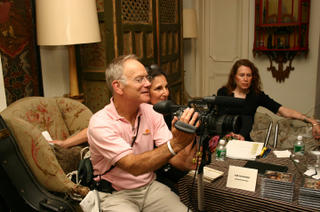
Anyway, went over the whole meeting planned with the US Consular team. Logistics and possibilities apart, my main concern was to make sure they don't request, they conduct themselves as equals, realize both sides gain and not just simply as Giver and Receiver. Happily Ragini is like me. She gets it immediately, as I knew she would. After all, it was Pabung Gambhi and Imasi Radha's style too.
Took almost 2 hours for something that might not even be in thr final cut.
Hot again on Fifth Avenue yesterday, even tho it was 7 when we started. Dusk over here, dawn over there; HD crew here, miniDV over there. There were joggers round the reservoir - at eye level, through the trees. Wondered if this is where Kieran runs.
Mirra thinks the dawn breaking over there will be nice. i agree. Always astonished how she (and other filmmakers) can keep that artistic eye in the middle of all that techno-logistical stuff.
I hope the footage will match if Mirra decides to us this in the final film. First time I have actually be the subject of a filmshoot. I had so much work to do really, I forgot about the camera. But I even went Jewish with an few "Oy vey"s trying to get thru on Ragini's cell phone. Mirra thinks my frustration looked good in the shot - hah, I could've done without it.

Anyway, went over the whole meeting planned with the US Consular team. Logistics and possibilities apart, my main concern was to make sure they don't request, they conduct themselves as equals, realize both sides gain and not just simply as Giver and Receiver. Happily Ragini is like me. She gets it immediately, as I knew she would. After all, it was Pabung Gambhi and Imasi Radha's style too.
Took almost 2 hours for something that might not even be in thr final cut.
Thursday, August 11, 2005
CHATTING ABOUT 9/11
HAT: i loved pee wee
AA: loved? LOVED?
HAT: adored
HAT: worshipped
AA: why in the past?
AA: i still fucking do
HAT he’s no longer around is he?
AA: but thanks to the magic of dvd technology he'll be with us forever
HAT: tee hee
AA: and for the rest of my life, whenever i hear the secret word (zyzzybaloobah) i'll scream it loud!
HAT: i'm sure you liked cowboy curtis
AA: and ricardo
AA: such a hunk
HAT: if cowboy curtis were to ride the nyc subways today he’d get arrested
AA: for?
HAT: he always has a suspiciously large package
HAT: ba-da-bing!
HAT: you there?
AA: i thought it was for playing in matrix 2 and 3
HAT: oh i guess you’d have to a newyorker for that one
AA: explain, you snob
HAT: there are posters in all the subway cars now since 9/11
HAT: asking you to call the police if you see any suspiciously large packages
AA: oh, very good
HAT: i thought so too
AA: sorry i missed it
AA: ok, i'm hungry
HAT: order in chinese
AA: and this friend is waiting for me to watch a movie
HAT: which
AA: the towering inferno
HAT: lol
AA: been wanting to see it again since sept. 12, 2001
HAT: hehe
AA: btw, that joke about ordering in chinese was uncalled for
AA: i tried for an hour
AA: in vain
HAT: and you think sept. 12 was?
HAT: ok ok that was um a little below the belt
AA: it's almost true, though
HAT: oh yeah?
AA: on sept. 9 or so of that year
AA: some friends and i
AA: were talking about these old disaster movies
AA: and having a blast
HAT: best is poseidon adventure
AA: so to speak
HAT: lol
AA: oh yeah! with shelley winter swimming underwater in that brown chiffon dress
AA: a classic
HAT: when her arse is pushed thru the porthole
AA: arse? you a brit now?
HAT: i thought it sounded funnier with an accent
AA: 2 days later, bang!
HAT: i hope you were contrite
AA: and i lived on 4th st. between 2nd and 1st
AA: we were cut off for several days
AA: illegal sublet
HAT: i lived on 5th between 3 and 2nd
AA: no id with address
AA: really?
HAT: not on 9/11
AA: oh
AA: i was gonna say, we must have met at the boiler room
HAT: i lived on south street then
HAT: office on john
AA: where is that?
AA: soho?
HAT: john is one block from wtc
HAT: south like 10 blocks
AA: oh my
AA: front row center
HAT: didn’t hang at the boiler room much
AA: must have been awful
AA: 9/11 i mean
HAT: i didn’t see anything
AA: weren't you there?
AA: wtc i mean
HAT: yes but…
AA: oh my god, you're blind
HAT: my assistant was trapped in the office
AA: you have an assistant?
AA: cool
HAT: and my exroomie was in tower one
AA: did he die?
HAT: yes
AA: shit
AA: sorry
HAT: it’s ok
HAT: assistant went in early and got blocked in
AA: and died?
HAT: no
AA: oh, blocked in your office
HAT: there was one building between my office building and wtc
HAT: we don’t know this much but it was a blackout
AA: honestly, i don't think i'm over 9/11 yet
HAT: lose anyone?
AA: no
AA: but being there was so strange
AA: the fliers
AA: everywhere
HAT: mine is still up at st. vincent's
AA: for whom?
AA: your ex roomie?
HAT: my friend
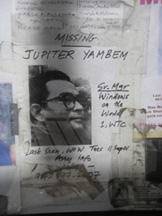
AA: all these happy pictures of dead people
AA: wedding pics
AA: vacations
HAT: it was stupid
AA: it moved me
HAT: but it was all one could do
AA: yes
HAT: he was the only guy in nyc i spoke my language with
AA: oh
HAT: it was as if i was struck dumb
AA: of course
HAT: his dad and my dad were in grade school together
AA: known him all your life?
HAT: yes
AA: shit
AA: i'm sorry i brought that up
HAT: only person here who knew my previous life
HAT: it’s ok
AA: not really
AA: i'm ruining your evening
HAT: yes
AA: i'm so sorry
HAT: he was with me on 5th street
AA: can we talk about something else?
HAT: sure
HAT: i've actually talked it all out
AA: therapy?
HAT: i gave 6 hours of testimony for columbia's 9/11 oral history project
AA: oh wow
AA: that must have been tough
HAT: yeah
HAT: but a good thing to do
AA: both for you and for the rest of us
AA: like holocaust testimonies
AA: perhaps
AA: things that need to be preserved
HAT: yes
HAT: his was one few bodies actually found
AA: that's good
HAT: oh i don’t know
HAT: only parts
AA: this is horrible
HAT: i'm sorry
HAT: now i've ruined YOUR evening
AA: no, i am
AA: i always authorize myself to joke about this
AA: because i was there
HAT: theres lots more but i wont go into it :)
AA: and very affected by it
HAT: oh yeah i understand that
AA: (thanks)
AA: but the way i was affected was nothing
AA: compared to actually losing someone
AA: all i lost was a 14-year relationship
HAT: how?
AA: we all got crazy after 9/11
HAT: hehe i remember
HAT: i lost my job and apartment too
AA: the whole fucking world's been crazy since then
AA: now more than ever
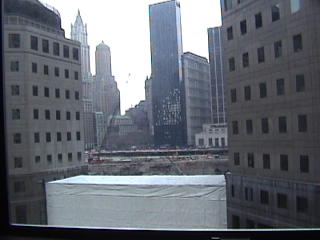
HAT: one day that week...
HAT: i woke up in my loft...
HAT: no power still but i used to sneak back...
HAT: and i looked up the phone book...
HAT: and called my first bf after 10+ years...
HAT: he said ... he died?... and i said yes...
HAT: you see we used to hang together in ny
AA: your friend
AA: roomie
HAT: even before he met his wife
HAT: him, me, my bf, his then gf
HAT: so the only one i wanted to talk to was my ex
AA: makes sense
HAT: so he said. how did you know i was here?
HAT: i said, i didn’t... i just looked you up...
HAT: he’d just come back two weeks before...he lives in asia now
HAT: then i cried… the first time i cried
HAT: until then it was dna samples, st. vincent's, posters... all that shit,
AA: then all breaks down all of a sudden
HAT: and of course his family calling me
HAT: my cellphone bill that month was over 2000
AA: that whole autumn in new your was just insane
AA: so intense
AA: the fun we were having was weird
HAT: funny thing was no one uptown had an idea what it was like
AA: i remember 2nd avenue totally empty
AA: in the middle of the day and week
AA: the bars and restaurant emptying their stock
AA: the night of the 11 everybody was insanely drunk
AA: i had never seen that in ny
HAT: i'm actually still in trauma
AA: of course
HAT: only my closest friends know this
AA: and your farthest in my case
HAT: lol
AA: heh, i made you laugh!
HAT: now anyone can listen on columbia's website lol
AA: yeah
AA: it is up?
HAT: read sons and lovers?
HAT: no it has to be transcribed first and then i want to take a few things out
HAT: i just did it in june
AA: no i haven't
AA: oh, very recent
HAT: there is a scene where the protagonist shares his closest innermost with a complete stranger
HAT: lawrence writes that section beautifully
HAT: i mean i didn’t lose my wife or child or anything like that
AA: still, i think i'm gonna watch earthquake instead
AA: friends are our wives and children
HAT: theres a group of waiters and busboys in nyc
HAT: who meet in jackson heights
HAT: all immigrants: latinos, bangladeshis, etc
HAT: and they talk of 9/11 and the friends they lost
AA: all the time?
AA: geez
HAT: like once a month I think
AA: that doesn't surprise me actually
HAT: they don’t have to testify in washington lol
AA: lol
HAT: i loved pee wee
AA: loved? LOVED?
HAT: adored
HAT: worshipped
AA: why in the past?
AA: i still fucking do
HAT he’s no longer around is he?
AA: but thanks to the magic of dvd technology he'll be with us forever
HAT: tee hee
AA: and for the rest of my life, whenever i hear the secret word (zyzzybaloobah) i'll scream it loud!
HAT: i'm sure you liked cowboy curtis
AA: and ricardo
AA: such a hunk
HAT: if cowboy curtis were to ride the nyc subways today he’d get arrested
AA: for?
HAT: he always has a suspiciously large package
HAT: ba-da-bing!
HAT: you there?
AA: i thought it was for playing in matrix 2 and 3
HAT: oh i guess you’d have to a newyorker for that one
AA: explain, you snob
HAT: there are posters in all the subway cars now since 9/11
HAT: asking you to call the police if you see any suspiciously large packages
AA: oh, very good
HAT: i thought so too
AA: sorry i missed it
AA: ok, i'm hungry
HAT: order in chinese
AA: and this friend is waiting for me to watch a movie
HAT: which
AA: the towering inferno
HAT: lol
AA: been wanting to see it again since sept. 12, 2001
HAT: hehe
AA: btw, that joke about ordering in chinese was uncalled for
AA: i tried for an hour
AA: in vain
HAT: and you think sept. 12 was?
HAT: ok ok that was um a little below the belt
AA: it's almost true, though
HAT: oh yeah?
AA: on sept. 9 or so of that year
AA: some friends and i
AA: were talking about these old disaster movies
AA: and having a blast
HAT: best is poseidon adventure
AA: so to speak
HAT: lol
AA: oh yeah! with shelley winter swimming underwater in that brown chiffon dress
AA: a classic
HAT: when her arse is pushed thru the porthole
AA: arse? you a brit now?
HAT: i thought it sounded funnier with an accent
AA: 2 days later, bang!
HAT: i hope you were contrite
AA: and i lived on 4th st. between 2nd and 1st
AA: we were cut off for several days
AA: illegal sublet
HAT: i lived on 5th between 3 and 2nd
AA: no id with address
AA: really?
HAT: not on 9/11
AA: oh
AA: i was gonna say, we must have met at the boiler room
HAT: i lived on south street then
HAT: office on john
AA: where is that?
AA: soho?
HAT: john is one block from wtc
HAT: south like 10 blocks
AA: oh my
AA: front row center
HAT: didn’t hang at the boiler room much
AA: must have been awful
AA: 9/11 i mean
HAT: i didn’t see anything
AA: weren't you there?
AA: wtc i mean
HAT: yes but…
AA: oh my god, you're blind
HAT: my assistant was trapped in the office
AA: you have an assistant?
AA: cool
HAT: and my exroomie was in tower one
AA: did he die?
HAT: yes
AA: shit
AA: sorry
HAT: it’s ok
HAT: assistant went in early and got blocked in
AA: and died?
HAT: no
AA: oh, blocked in your office
HAT: there was one building between my office building and wtc
HAT: we don’t know this much but it was a blackout
AA: honestly, i don't think i'm over 9/11 yet
HAT: lose anyone?
AA: no
AA: but being there was so strange
AA: the fliers
AA: everywhere
HAT: mine is still up at st. vincent's
AA: for whom?
AA: your ex roomie?
HAT: my friend
AA: all these happy pictures of dead people
AA: wedding pics
AA: vacations
HAT: it was stupid
AA: it moved me
HAT: but it was all one could do
AA: yes
HAT: he was the only guy in nyc i spoke my language with
AA: oh
HAT: it was as if i was struck dumb
AA: of course
HAT: his dad and my dad were in grade school together
AA: known him all your life?
HAT: yes
AA: shit
AA: i'm sorry i brought that up
HAT: only person here who knew my previous life
HAT: it’s ok
AA: not really
AA: i'm ruining your evening
HAT: yes
AA: i'm so sorry
HAT: he was with me on 5th street
AA: can we talk about something else?
HAT: sure
HAT: i've actually talked it all out
AA: therapy?
HAT: i gave 6 hours of testimony for columbia's 9/11 oral history project
AA: oh wow
AA: that must have been tough
HAT: yeah
HAT: but a good thing to do
AA: both for you and for the rest of us
AA: like holocaust testimonies
AA: perhaps
AA: things that need to be preserved
HAT: yes
HAT: his was one few bodies actually found
AA: that's good
HAT: oh i don’t know
HAT: only parts
AA: this is horrible
HAT: i'm sorry
HAT: now i've ruined YOUR evening
AA: no, i am
AA: i always authorize myself to joke about this
AA: because i was there
HAT: theres lots more but i wont go into it :)
AA: and very affected by it
HAT: oh yeah i understand that
AA: (thanks)
AA: but the way i was affected was nothing
AA: compared to actually losing someone
AA: all i lost was a 14-year relationship
HAT: how?
AA: we all got crazy after 9/11
HAT: hehe i remember
HAT: i lost my job and apartment too
AA: the whole fucking world's been crazy since then
AA: now more than ever

HAT: one day that week...
HAT: i woke up in my loft...
HAT: no power still but i used to sneak back...
HAT: and i looked up the phone book...
HAT: and called my first bf after 10+ years...
HAT: he said ... he died?... and i said yes...
HAT: you see we used to hang together in ny
AA: your friend
AA: roomie
HAT: even before he met his wife
HAT: him, me, my bf, his then gf
HAT: so the only one i wanted to talk to was my ex
AA: makes sense
HAT: so he said. how did you know i was here?
HAT: i said, i didn’t... i just looked you up...
HAT: he’d just come back two weeks before...he lives in asia now
HAT: then i cried… the first time i cried
HAT: until then it was dna samples, st. vincent's, posters... all that shit,
AA: then all breaks down all of a sudden
HAT: and of course his family calling me
HAT: my cellphone bill that month was over 2000
AA: that whole autumn in new your was just insane
AA: so intense
AA: the fun we were having was weird
HAT: funny thing was no one uptown had an idea what it was like
AA: i remember 2nd avenue totally empty
AA: in the middle of the day and week
AA: the bars and restaurant emptying their stock
AA: the night of the 11 everybody was insanely drunk
AA: i had never seen that in ny
HAT: i'm actually still in trauma
AA: of course
HAT: only my closest friends know this
AA: and your farthest in my case
HAT: lol
AA: heh, i made you laugh!
HAT: now anyone can listen on columbia's website lol
AA: yeah
AA: it is up?
HAT: read sons and lovers?
HAT: no it has to be transcribed first and then i want to take a few things out
HAT: i just did it in june
AA: no i haven't
AA: oh, very recent
HAT: there is a scene where the protagonist shares his closest innermost with a complete stranger
HAT: lawrence writes that section beautifully
HAT: i mean i didn’t lose my wife or child or anything like that
AA: still, i think i'm gonna watch earthquake instead
AA: friends are our wives and children
HAT: theres a group of waiters and busboys in nyc
HAT: who meet in jackson heights
HAT: all immigrants: latinos, bangladeshis, etc
HAT: and they talk of 9/11 and the friends they lost
AA: all the time?
AA: geez
HAT: like once a month I think
AA: that doesn't surprise me actually
HAT: they don’t have to testify in washington lol
AA: lol
Sunday, August 07, 2005
ON BASEBALL: STRENGTH INITIATIVE
Greetings Peter (and Hi Richard):
I imagine you are in China right now. Richard forwarded me your thoughts after our meeting. I took some time to think it over.
Peter, I am most impressed with what you are doing in Chiangmai and the concise encapsulation of our meeting. So thank you very much and we would love to have you join us at one of our meetings to discuss some of the ideas we batted around.
I like the democratic way of discussion and interaction you propose. Perhaps this is the time to see the community as the active unit rather than the person. It is the established traditional way of doing things in Asia as I am sure you are well aware, but one that is once again gaining some universal relevance in the IT era. We are also probably aware, sad irony here, that it is often not seen by policy makers and entrenched professionals.
When we think our Strength Initiative - "Fitness" conjures up too many images of spandex on ESPN2, "Power" might bristle some mustaches, and "Wellness" sounds good for you but rather awful tasting - we do want to keep baseball in the forefront. We don't want to get it lost among the many health initiatives in this part of the world, but we do want to leverage it in a holistic way. After all, we think of First Pitch as serious fun, on the premise that without fun, nothing serious can be achieved.
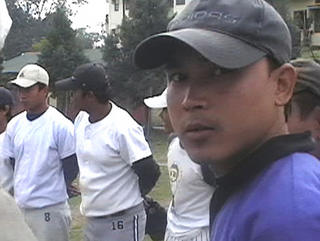
Peter, Manipur is a last frontier of a sort. I have yet to come across a civilization with its degree of doll-house minitiarization of culture. Its isolation offers intriguing possibilities in an Asian variant of a post-1989 Estonia for example.
There is naturally a part of me that loves my country and my people. But what jazzes me, is not 20th century nationalism. I say this because there is a nationalist conflict there as we discussed, that is tied in with the HIV/heroin problem and other health issues.
What I see is the the sliver of opportunity to play with ideas of 21st century interconnectivity and distributive potential. How can we use this for the re-purposing and re-envisioning of a culture? What you picked up on the functioning of the leikai, the traditional neighborhood, is very much the case in point. It will make people there "get" it, talk a language and use and revive deeply-embedded symbols. Without this, the culture dies. Now nothing lasts forever and we have no business being sentimental. But diversity is healthy and enriching so I do not see this venture as one for Manipur only. It is a lab with a somewhat different kind of culture if you will.
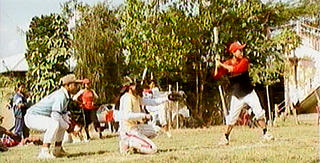
I would like the Strength Initiative to be as important in its process of becoming as in its product. Otherwise we bifurcate into the giver and the receiver - a somewhat heavy demand of legerdemain on someone already bifurcated like me. Our approach is two-faced: what is the best way to give? And the best way to receive? it has lessons for both sides I think, so it is not merely top-down.
We are thinking along the same lines for our ballpark too, hopefully a project in vernacular architecture that may, for instance, start with revisiting the local shaman's construction-manual-ritual. I would like the process of building the ballpark to result in more than just a nice field to play in. Because if it doesn't, the field won't stay nice for very long.
Perhaps the Strength initiative too will deliver much more along the way to good health.
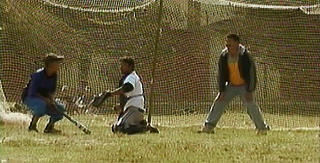
Peter, we have some equipment donated to us. We have a team from the US Consulate making a trip next week to look into baseball in Manipur. What we are working towards is a one-week All-Stars Tournament within the next 12 months, preceded by a month-long training camp for about 50 players. We are working on a US coach going to observe, maybe train if we swing month-long visas. We shoot our film then too of course.
So how can we make some of the Big Over-Arching Ideas we have talked about work here? How can we start putting some pieces in place and begin our learning process? Can we use the coach, the camp? That's what I would like to think about with you.
Greetings Peter (and Hi Richard):
I imagine you are in China right now. Richard forwarded me your thoughts after our meeting. I took some time to think it over.
Peter, I am most impressed with what you are doing in Chiangmai and the concise encapsulation of our meeting. So thank you very much and we would love to have you join us at one of our meetings to discuss some of the ideas we batted around.
I like the democratic way of discussion and interaction you propose. Perhaps this is the time to see the community as the active unit rather than the person. It is the established traditional way of doing things in Asia as I am sure you are well aware, but one that is once again gaining some universal relevance in the IT era. We are also probably aware, sad irony here, that it is often not seen by policy makers and entrenched professionals.
When we think our Strength Initiative - "Fitness" conjures up too many images of spandex on ESPN2, "Power" might bristle some mustaches, and "Wellness" sounds good for you but rather awful tasting - we do want to keep baseball in the forefront. We don't want to get it lost among the many health initiatives in this part of the world, but we do want to leverage it in a holistic way. After all, we think of First Pitch as serious fun, on the premise that without fun, nothing serious can be achieved.

Peter, Manipur is a last frontier of a sort. I have yet to come across a civilization with its degree of doll-house minitiarization of culture. Its isolation offers intriguing possibilities in an Asian variant of a post-1989 Estonia for example.
There is naturally a part of me that loves my country and my people. But what jazzes me, is not 20th century nationalism. I say this because there is a nationalist conflict there as we discussed, that is tied in with the HIV/heroin problem and other health issues.
What I see is the the sliver of opportunity to play with ideas of 21st century interconnectivity and distributive potential. How can we use this for the re-purposing and re-envisioning of a culture? What you picked up on the functioning of the leikai, the traditional neighborhood, is very much the case in point. It will make people there "get" it, talk a language and use and revive deeply-embedded symbols. Without this, the culture dies. Now nothing lasts forever and we have no business being sentimental. But diversity is healthy and enriching so I do not see this venture as one for Manipur only. It is a lab with a somewhat different kind of culture if you will.

I would like the Strength Initiative to be as important in its process of becoming as in its product. Otherwise we bifurcate into the giver and the receiver - a somewhat heavy demand of legerdemain on someone already bifurcated like me. Our approach is two-faced: what is the best way to give? And the best way to receive? it has lessons for both sides I think, so it is not merely top-down.
We are thinking along the same lines for our ballpark too, hopefully a project in vernacular architecture that may, for instance, start with revisiting the local shaman's construction-manual-ritual. I would like the process of building the ballpark to result in more than just a nice field to play in. Because if it doesn't, the field won't stay nice for very long.
Perhaps the Strength initiative too will deliver much more along the way to good health.

Peter, we have some equipment donated to us. We have a team from the US Consulate making a trip next week to look into baseball in Manipur. What we are working towards is a one-week All-Stars Tournament within the next 12 months, preceded by a month-long training camp for about 50 players. We are working on a US coach going to observe, maybe train if we swing month-long visas. We shoot our film then too of course.
So how can we make some of the Big Over-Arching Ideas we have talked about work here? How can we start putting some pieces in place and begin our learning process? Can we use the coach, the camp? That's what I would like to think about with you.
Wednesday, August 03, 2005
AN AMERICAN PITCH TO MANIPUR
(Note: I rather prefer my article before The Statesman published it July 30. So here goes....)
"Looks like you've brought a bit of India already," a gentleman said gamely, loosening his tie. Bright, hot sunlight filtered through the trees of Central Park and streamed into the elegant Fifth Avenue drawing rooms of Mrs. Elizabeth Brockman.
That humid June evening, about 100 New Yorkers with a passion for the Great American Pastime of baseball gathered to launch First Pitch: The US Manipur Baseball Project. Baseball stars, sportswriters, artists, playwrights, filmmakers, doctors, psychiatrists, lawyers, fashion designers, an Ambassador and a Maharaja gathered over hotdogs and Manipuri style canapés made of lotus-root fritters, and stumbled sportingly through America’s baseball anthem, “Take Me Out to the Ball Game” in Manipuri. The award-winning filmmaker Mirra Bank, and Vic Losick, her cameraman, began shooting their full-length documentary on Manipuri baseball.
Their questions seemed to hang in the air: Baseball in the Eastern Himalayas? 26 teams? How? But wait, just WHERE is Manipur?
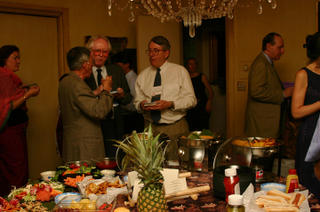
Ever since 2002 when my cousin Ragini Salam, a city councilor, surprised me with a request for a few bats for a baseball team, I have had to answer these questions over and over again in the US. Of course, I could simply have sent over a few bats and balls. But being acutely aware, of the deep and corrosive desire of material goods from the West in the rest of the world, I had no desire to be just a conduit for American products.
But perhaps there might be another more meaningful way, I thought. After all, ever since my visit to Manipur in 2000 after an absence of about 15 years, as an independent media arts curator, I had been searching for a project that would bring together my love of my native Manipur, my experience in America, my adopted home, and my professional interest in cultural interaction.
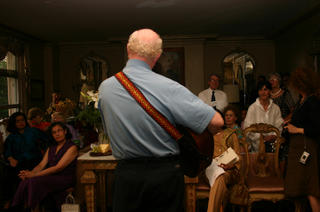
I am not a great fan of baseball but I had always enjoyed the game as a dramatic, almost mythic, celebration and expression of America. Encouraged by a remark from a producer at a television channel, I approached my friend Muriel (Mike) Peters, a film producer and a diehard New York Mets fan with whom I had spent many summer afternoons at the team's Shea Stadium.
A long-time friend of India, Mike was delighted and fascinated to hear of a place in India where they played baseball instead of cricket. But what impressed her most was that the game had taken root and survived against staggering odds, in a poor, isolated border state riddled with conflict. Here was the game played for the sheer love of it, unscarred by multi-million dollar salaries and steroid scandals. It was my conversations with Mike that sowed the seeds of First Pitch.

The real challenge was the construction of an interface between the American and Manipuri passion for baseball. One was a Superpower whose track record of interactions with other cultures has unfortunately often been blundering and plundering. The other was the remarkable but poverty-stricken 1.5 million Manipuri Meiteis, a proud people locked in 45-year old secessionist conflict with a country 1 billion-strong in one of the most inaccessible and closed-off regions in the world today.
With travel restrictions for foreign nationals, no tourism, sweatshops or outsourced jobs, globalization comes to Manipur primarily through the ether, via film, television and the Internet. Manipuri civilization prizes physical culture giving birth to polo and acrobatic dancer drummers who cannot sit still. So how might the isolated Manipuri Meitei respond to an American overture based on an appreciation of his athletic prowess, I wondered?
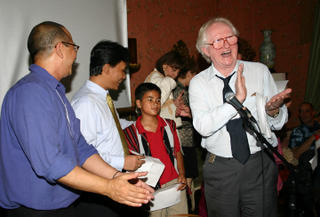
What would Manipuri Meiteis make of foreign aid that did not first diminish them by saying something was wrong and try to save them? How would it help this ancient civilization of this mountain corridor represent and repurpose itself, as it surely must, as the rising powers of India and China compete once again in Southeast Asia?
Perhaps it was possible to have an exchange that played to the decent and the strong in the two remarkable cultures that I had grown to love. What if we put aside the insensitive Ugly American and the warring Manipuri Meitei, for an alternate post- and transnational exchange fit for the 21st century, one that uses globalization for the empowerment of smaller cultures?
On the other side of the globe, the problem was the stunning void of information about Manipur even among Americans with a first-hand or academic familiarity with India. And what little they knew reflected the confining, exoticized Manipur-land-of-dances-and-green-hills image that Manipuri Meiteis have lived with in India. The vast New York Public Library system carries a mere 148 entries on Manipur. So I decided the first step towards a baseball project in Manipur would be to take Mike there.
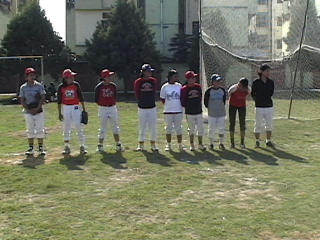
Mike and I went to Manipur in the fall of 2004. We were part of a group of 7 artists and arts producers that undertook a cultural-immersion week that I organized with the support of the Asian Cultural Council in New York and the Manipur State Government. With a foot firmly planted in both cultures, I presented Manipur to my American friends, and America to my Manipuri Meitei friends. Mike brought two baseball rulebooks to replace the Xeroxed copy the players had been using, a dozen balls, and training DVDs. We screened Ken Burns’ celebrated television series on baseball and Field of Dreams, the baseball film starring Kevin Costner. We surveyed a lovely field that the Sagolband Leikai’s Western Star Club had pledged to us for a ballpark. The ball players for their part organized an exhibition match on American Thanksgiving Day followed by a burger-and-coke picnic-lunch.
We established First Pitch upon our return. As the Chairman of the organization, she pulled together a generous and amusingly diverse Board of baseball enthusiasts – a writer who played short-stop, a urologist who was a diehard Yankees fan, a sports marketing consultant, a lawyer married to the premier singer of baseball songs in the country, and an artist who rendered his own Irish American representation of Pakhangba, the Manipuri uroboros deity catching a baseball. We garnered the support of the Louisville Slugger Museum and the Spalding, the manufacturer of baseball equipment. We made Baseball Dreams, a short promotional film, put together by Dave Thoudam, a young Manipuri Meitei filmmaker.
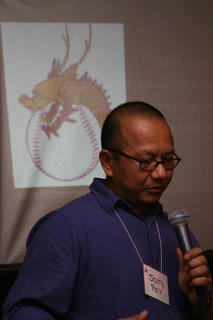
A non-profit initiative, with a local chapter forming in Imphal, First Pitch plans to work with Manipur's 18 leikai, or neighborhood, sports clubs that have between them an astonishing 26 baseball teams and 4 women's teams. It will provide equipment, professional coaching, and build South Asia's first baseball park in Imphal, to be named after Maharaja Churachand, the founder of modern sports in Manipur.
Strategically, First Pitch's goal is to establish India's baseball center in Manipur, in the only place in India where the game does not languish in the shadow of cricket. It also recognizes that Manipur’s historical role is once again re-emerging with globalization and sees the baseball center as the link between South and Southeast Asian baseball.
We have quite a ways to go for we have only just begun. In the meantime we go to ball games. And sign our emails, “Yours in Baseball.…”
(Note: I rather prefer my article before The Statesman published it July 30. So here goes....)
"Looks like you've brought a bit of India already," a gentleman said gamely, loosening his tie. Bright, hot sunlight filtered through the trees of Central Park and streamed into the elegant Fifth Avenue drawing rooms of Mrs. Elizabeth Brockman.
That humid June evening, about 100 New Yorkers with a passion for the Great American Pastime of baseball gathered to launch First Pitch: The US Manipur Baseball Project. Baseball stars, sportswriters, artists, playwrights, filmmakers, doctors, psychiatrists, lawyers, fashion designers, an Ambassador and a Maharaja gathered over hotdogs and Manipuri style canapés made of lotus-root fritters, and stumbled sportingly through America’s baseball anthem, “Take Me Out to the Ball Game” in Manipuri. The award-winning filmmaker Mirra Bank, and Vic Losick, her cameraman, began shooting their full-length documentary on Manipuri baseball.
Their questions seemed to hang in the air: Baseball in the Eastern Himalayas? 26 teams? How? But wait, just WHERE is Manipur?

Ever since 2002 when my cousin Ragini Salam, a city councilor, surprised me with a request for a few bats for a baseball team, I have had to answer these questions over and over again in the US. Of course, I could simply have sent over a few bats and balls. But being acutely aware, of the deep and corrosive desire of material goods from the West in the rest of the world, I had no desire to be just a conduit for American products.
But perhaps there might be another more meaningful way, I thought. After all, ever since my visit to Manipur in 2000 after an absence of about 15 years, as an independent media arts curator, I had been searching for a project that would bring together my love of my native Manipur, my experience in America, my adopted home, and my professional interest in cultural interaction.

I am not a great fan of baseball but I had always enjoyed the game as a dramatic, almost mythic, celebration and expression of America. Encouraged by a remark from a producer at a television channel, I approached my friend Muriel (Mike) Peters, a film producer and a diehard New York Mets fan with whom I had spent many summer afternoons at the team's Shea Stadium.
A long-time friend of India, Mike was delighted and fascinated to hear of a place in India where they played baseball instead of cricket. But what impressed her most was that the game had taken root and survived against staggering odds, in a poor, isolated border state riddled with conflict. Here was the game played for the sheer love of it, unscarred by multi-million dollar salaries and steroid scandals. It was my conversations with Mike that sowed the seeds of First Pitch.

The real challenge was the construction of an interface between the American and Manipuri passion for baseball. One was a Superpower whose track record of interactions with other cultures has unfortunately often been blundering and plundering. The other was the remarkable but poverty-stricken 1.5 million Manipuri Meiteis, a proud people locked in 45-year old secessionist conflict with a country 1 billion-strong in one of the most inaccessible and closed-off regions in the world today.
With travel restrictions for foreign nationals, no tourism, sweatshops or outsourced jobs, globalization comes to Manipur primarily through the ether, via film, television and the Internet. Manipuri civilization prizes physical culture giving birth to polo and acrobatic dancer drummers who cannot sit still. So how might the isolated Manipuri Meitei respond to an American overture based on an appreciation of his athletic prowess, I wondered?

What would Manipuri Meiteis make of foreign aid that did not first diminish them by saying something was wrong and try to save them? How would it help this ancient civilization of this mountain corridor represent and repurpose itself, as it surely must, as the rising powers of India and China compete once again in Southeast Asia?
Perhaps it was possible to have an exchange that played to the decent and the strong in the two remarkable cultures that I had grown to love. What if we put aside the insensitive Ugly American and the warring Manipuri Meitei, for an alternate post- and transnational exchange fit for the 21st century, one that uses globalization for the empowerment of smaller cultures?
On the other side of the globe, the problem was the stunning void of information about Manipur even among Americans with a first-hand or academic familiarity with India. And what little they knew reflected the confining, exoticized Manipur-land-of-dances-and-green-hills image that Manipuri Meiteis have lived with in India. The vast New York Public Library system carries a mere 148 entries on Manipur. So I decided the first step towards a baseball project in Manipur would be to take Mike there.

Mike and I went to Manipur in the fall of 2004. We were part of a group of 7 artists and arts producers that undertook a cultural-immersion week that I organized with the support of the Asian Cultural Council in New York and the Manipur State Government. With a foot firmly planted in both cultures, I presented Manipur to my American friends, and America to my Manipuri Meitei friends. Mike brought two baseball rulebooks to replace the Xeroxed copy the players had been using, a dozen balls, and training DVDs. We screened Ken Burns’ celebrated television series on baseball and Field of Dreams, the baseball film starring Kevin Costner. We surveyed a lovely field that the Sagolband Leikai’s Western Star Club had pledged to us for a ballpark. The ball players for their part organized an exhibition match on American Thanksgiving Day followed by a burger-and-coke picnic-lunch.
We established First Pitch upon our return. As the Chairman of the organization, she pulled together a generous and amusingly diverse Board of baseball enthusiasts – a writer who played short-stop, a urologist who was a diehard Yankees fan, a sports marketing consultant, a lawyer married to the premier singer of baseball songs in the country, and an artist who rendered his own Irish American representation of Pakhangba, the Manipuri uroboros deity catching a baseball. We garnered the support of the Louisville Slugger Museum and the Spalding, the manufacturer of baseball equipment. We made Baseball Dreams, a short promotional film, put together by Dave Thoudam, a young Manipuri Meitei filmmaker.

A non-profit initiative, with a local chapter forming in Imphal, First Pitch plans to work with Manipur's 18 leikai, or neighborhood, sports clubs that have between them an astonishing 26 baseball teams and 4 women's teams. It will provide equipment, professional coaching, and build South Asia's first baseball park in Imphal, to be named after Maharaja Churachand, the founder of modern sports in Manipur.
Strategically, First Pitch's goal is to establish India's baseball center in Manipur, in the only place in India where the game does not languish in the shadow of cricket. It also recognizes that Manipur’s historical role is once again re-emerging with globalization and sees the baseball center as the link between South and Southeast Asian baseball.
We have quite a ways to go for we have only just begun. In the meantime we go to ball games. And sign our emails, “Yours in Baseball.…”